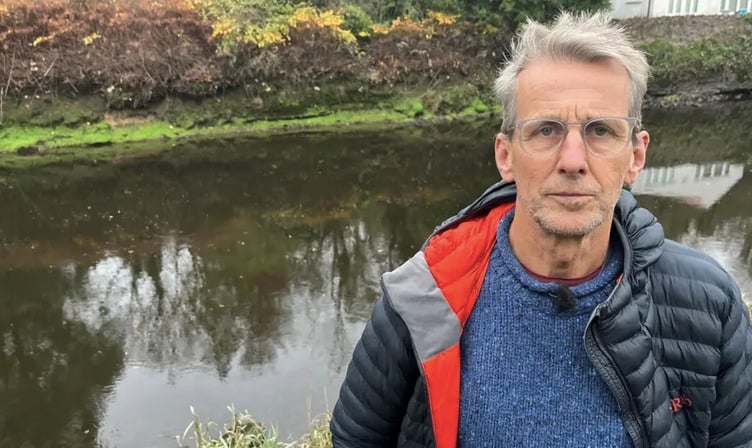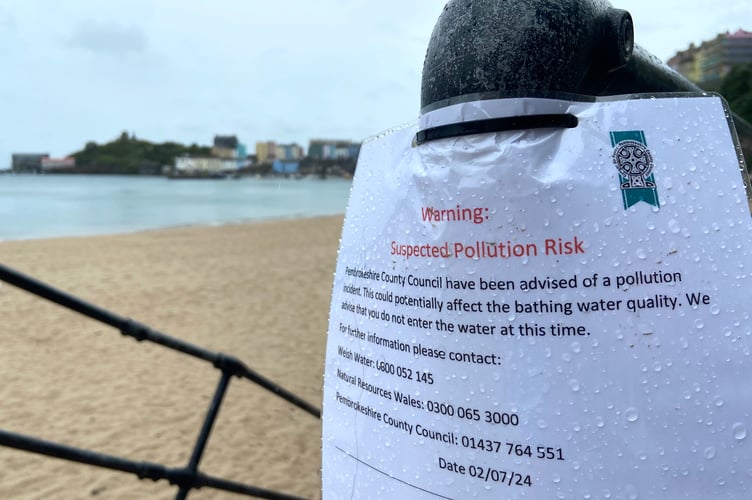A campaign group that aims to shine a spotlight on a Pembrokeshire waterway to protect its importance, has exposed further failings from Welsh Water/Dŵr Cymru at a local pumping station, which resulted in tens of thousands of cubic metres of untreated waste water - including sewage being dumped in one of the county’s rivers.
The Cleddau Project, which has been working with local people, groups and organisations since forming, to encourage greater care for waters and habitats in Pembrokeshire, has stated that Welsh Water data revealed that pumps at Picton in Haverfordwest have only been running at 80% capacity from July 2022 to February 2024, meaning that 56,000 cubic metres, which should have been going to a sewage treatment plant, was instead going into a special conservation area of the Western Cleddau.
The Eastern and Western Cleddau Rivers unite at Picton Point to form the Daugleddau Estuary.
Often referred to as Pembrokeshire’s hidden waterway, the estuary snakes some 16 miles south, picking up the Carew and Cresswell rivers on its way to meet the sea at St Anne’s Head.
In an interview with the BBC, The Cleddau Project's Ric Cooper said campaigners had investigated the matter, because an overflow pipe at Picton playing fields appeared to be spilling more raw sewage than usual.
The group asked Welsh Water for pump performance data from the nearby pumping station, and according to Mr Cooper, they are supposed to pump at 120 litres a second, but had only been operating at "95 or 96".
“That means 20% of what should have gone for treatment was going straight into the river,” he explained.
“We calculated over 12 months, and it averages out as 17 tankers a day emptying into this river.
“You can imagine the outcry if on 17 occasions, a tanker pulled up and let it all go!”
The Cleddau Project said it found high levels of ammonia in the water and that tests showed sewage was being discharged at levels toxic to fish.
The group also revealed that the matter was reported to Natural Resources Wales (NRW) several times, with the organisation investigation issues in June 2023, almost a year later.
Campaigners said it then took another nine months before the pumps were back up to speed.

Welsh Water has come in for high criticism across the county of late, with councillors in Tenby and its surrounding area holding the organisation to account in recent months following a leak from the seaside town’s main sewage pipe at the Wastewater Treatment Works at Gumfreston which almost led to a pollution disaster heading into the summer holidays.
It led to Natural Resources Wales and Pembrokeshire County Council issung a pollution alert and declaring an ‘abnormal situation’ - with a sewage threat prsented to Tenby’s South, Castle, North and Penally beaches at the start of July.
In light of Welsh Water stating that it was in no rush to replace the faulty fixture, calls were made by County councillor for Tenby’s north ward Michael Williams to Pembrokeshire Council’s chief executive and public protection manager urging strong action be taken, due to what he called a ‘totally inept enforcement regime’ in Natural Resources Wales in not coming down hard enough on this ‘failing’ water operator.
“Our local tourist industry relies upon statutory bodies to provide the basic services, and this must include clean bathing waters, the reputational damage done is considerable,” stated Cllr Williams.
“Not many years ago we took action to insist that a UV plant was installed in the Gumfreston pumping station. Those of us involved in that campaign honestly believed at that time the company was intent on raising their standards.
“It appears that yet again the wool was pulled over our eyes!” he added.

On the latest incident for the county, Mid and South Pembrokeshire MP, Henry Tufnell said that the scale of untreated sewage spilling into the River Cleddau was ‘simply unacceptable’.
“Welsh Water’s data shows that 56,000 cubic metres of waste entered this conservation area - equivalent to 17 tanker loads per day,” he commented.
“The health of our rivers, wildlife, and communities depends on responsible stewardship of our water resources.
“I’ll continue to work with Welsh Water, NRW, and campaign groups to ensure that we prioritise clean water and environmental accountability across Pembrokeshire.”
Welsh Water have gone onto apologise for its failings in this matter, with a spokesperson stating: “We know our performance has fallen short of expectations on this occasion and for that we apologise.
“We have been working with the Cleddau Project, a citizen science group we help to fund, as well as share data and information with as part of our commitment to being transparent about our performance.
“Some of our assets need flow monitors and we are working to get installations complete by deadlines stated by our regulators.
“For Picton SPS, a flow monitor needed to be installed by 2025. We were able to install a monitor several years before this deadline, which gave us insight into its performance earlier than our regulators required.
“We were able to assess its flow, identifying the cause of the underperformance, which was the control of the pumps. To fix this a bespoke control panel was needed, which had a 26-week manufacturing lead time due to its specialist nature.
“Work to install the new control panel started in December 2023, and it was operational in January.

“We expect the SPS to be compliant with its flow permit for 2024,” they added.
NRW confirmed it was made aware of a problem in June 2023, and was told by Welsh Water new pumps would be installed by October 31 of that year.
It said the deadline was missed and Welsh Water were given a formal warning.
The work to repair the pumps was completed in February 2024, NRW has confirmed, going onto state that the pumping station was "subject to a formal legal investigation for another matter".
The spokesperson for Welsh Water went onto offer further information on the wider Cleddau and its investment plans.
“We are delivering multi-million-pound improvements in the local area, specifically in our current investment cycle with a combined spend of £9.4million at Letterston, Spittal and Rosemarket wastewater treatment works.
“For 2025-2030 we’ve put forward plans for £100m of further enhancement and maintenance schemes for Pembrokeshire, to improve our asset base and reduce impact on water quality. This includes improving storm overflows and treatment works in local areas such as Haverfordwest and Wolfscastle.

“This is part of our plans to invest £4bn during that time, including £2.5bn on projects to improve the environment, subject to Ofwat approval,” they added.
Last month, Welsh Water was ordered to pay a £24.1m underperformance penalty by industry regulator Ofwat.
Last year, Dŵr Cymru released sewage into rivers, lakes and the sea around Wales for more than 916,000 hours.
David Black, chief executive of Ofwat said: “This year’s performance report is stark evidence that money alone will not bring the sustained improvements that customers rightly expect.
“It is clear that companies need to change and that has to start with addressing issues of culture and leadership. Too often we hear that weather, third parties or external factors are blamed for shortcomings.



